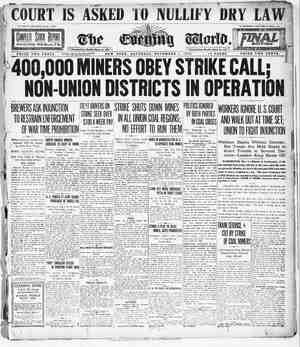The Seattle Star Newspaper, November 1, 1919, Page 20
You have reached the hourly page view limit. Unlock higher limit to our entire archive!
Subscribers enjoy higher page view limit, downloads, and exclusive features.
HERE IS AN EXAMPLE OF THREAT AND INTIMIDATION AS PRACTICED Under the “Closed Shop” Such un-American, autocratic customs will be eliminated through adoption of the American Plan:of Employment Shipyard worker is threatened with loss of “working card” if his wife does not give up her employment in “struck shop.” She remains loyal to her employer. Husband has new job. WU. A FRANKLIN. Invennannonat PasroewT) (0. P. REINEMEVER, twrenmationas wecnaTARy-Teansvese) Wrameerre O.e8. Ramene City. Ramana Wrameervs Bice. Bamens CiTY. Ranene ” Loca UNION'NO,_104 nae Se Because his wife insisted on her right as an American citizen to accept employ- ment where she pleased, this happening to be in a tailor shop which does not dis- criminate between members or non-members of Organized Labor, H. L. Storts, member of Local No. 104, Boiler Makers’ and Iron Shipbuilders’ and Helpers’ Union, and late employe in the Skinner & Eddy plant, is not today on his shipyard job. - The reasons arc illuminatingly related by John McKelvey, signing himself as Secretary-Treasurer of the Union, in a letter written to Mrs. Storts and reproduced herewith. 4 Mrs. Storts is an expert tailoress, working in the trousers manufacturing shop of August Ander, 309 People’s Bank Building. This shop, along with other tailoring Mrs, H-P..Storte,, establishments of the city which refused the recent journeymen tailors’ demands [118) sowllOth. nave. fBeattle-Wash. Dear, Mre. Storts), ' __ Ie-de with prof_ound_regret_tnat_1 am caliea upon @e_addreses this letter to you, We have information at_hand that-you are at this tine empleyed $08 Pe oples Bank BAilding, which shep ie unfair to Orgainised labor 3 e strike. ie en fer better living cond itions and better wages especially f ‘or WOMEN who are c empelled to work and it is the opinion of ergainised laboF as a whole that the act of any persen in wor in any esruck shop is determental to; all of Labor and more especially to your sex. ‘In the event ef your disre ‘this notice ana. continue o-w ork in any shop or factory fn wd @ strike is gn your Busbend Mr. B.Le Storts will have to shoulder the roepensibilt:y sAaiseenehebnone end] working ‘and membership cards taken from him. (Respectf fully ¥. The date “1918” in the above letter is a typographical error on part of the writer. It should be “1919.” for impossible wages and conditions, was an especial target of the strikers. Itisa “Contract” shop, employing highly skilled specialists in the making of trousers, and does such work for the merchant tailoring houses. The Tailors’ Union seeks the complete elimination of the “Contract” shop, upon which the smaller tailors, unable to hire a full corps of specialists, depend for much of their work, and, in fact, their existence. Mrs. Storts likes her work, and, despite the order to strike, loyally remained on the job. She was approached, as were other women employed by Mr. Ander, and urged to go on strike. Upon her emphatic refusal, the accompanying letter was addressed to her and handed to Mr. Storts at the headquarters of the Boiler Mak- ers’ and Iron Shipbuilders’ Union, in the Collins Building, on Saturday afternoon, October 25th, 1919, by an official of the Union, who also, in Mr. Storts’ hearing, called up the headquarters of the Journeymen Tailors’ Union, requesting that Mrs. Storts be watched, and stating that if she returned to her work for Mr. Ander, her husband would be deprived of his union card and his work in the shipyards. An interesting feature of the letter is that portion that the writer sought to ob- literate, but which stands out through the marks. It reads—‘“and the following of his being deprived of his position in the shipyards”—indicating that McKelvey sought to exercise at least some caution. Mr. Storts, knowing that his wife is especially desirous of retaining her present employment, made no attempt to go back to the yard, but through the assistance of the Associated Industries of Seattle, found a satisfactory job elsewhere. Shall we, as Patriotic Americans, whose .constitution guarantees the right to ‘‘life, liberty and the pursuit of happiness’’--- especially the right to seek employment when and where we desire---allow this liberty to be taken from us? Shall we permit threats, intimi- dation and coercion to control the lives and employment of our fellow men and women? The people of Seattle—and of the nation—now sense this danger. They will ADOPT THE AMERICAN PLAN and restore to the individual the inalienable rights obtained for him by the founders of our country. Associated Industries of Seattle






